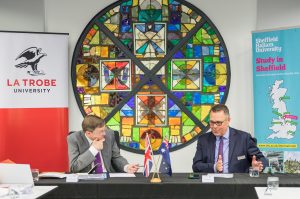I’m writing from Australia, where I am a few days into a fortnight of working abroad for the University. In this blog post, I want to explain what I’m doing.
Universities are rooted in place. The first thing I spotted about Sheffield Hallam when I came to look around before my interview for the job was the way it is central to the city. Once I understood a little bit more, I understood its rootedness in the history, geography and values of the city and the region. Our place in the city and the region is at the core of what we do, and I have written about that a lot. In our 2017 Transforming Lives strategy, we used a simple two-word phrase to describe that: ‘leading locally’ and over the last two years we have developed programmes of work in business, education and quality of life which give reality to the idea of leading locally.
Of course, we are also working on a much larger canvas. We are preparing our students for a world of ever greater international interdependence and connectivity. Families and friends are increasingly distributed across the globe. Business is increasingly global. Modern technologies mean that we can work on a project simultaneously in different time zones and then have a real-time technology enabled conversation about the project. Capital flows move around the world at phenomenal speeds.
Universities have done a good deal of thinking about how to position themselves in this global space. Some have – frankly – approached it as simply a business proposition. In the process, some have forgotten their own rootedness in place and begun to think of themselves as global corporations with multiple sites. You can go to parts of the Middle East and walk seamlessly from one international university teaching facility to another. Recent reports suggest that a good number of these branch campuses are struggling financially. It may be that thinking of global opportunities solely as business propositions is the wrong way to do it. It’s too easy to forget your roots and your purpose.
At Sheffield Hallam, we set a different test for our global ambitions. We said that we would look to work with ‘like-minded universities’ around the world in the best interests of our students, our staff and our ambitions. One of my purposes over these two weeks is to cement our first global strategic partnership, with La Trobe University in Melbourne, Australia.
La Trobe is similar to Sheffield Hallam in a number of important respects. It is about the same size, the student demographic characteristics are similar. It is rooted in its place, as we are and, like us, it thinks at global scale about cross-cutting challenges. Our global strategic partnership builds on deep roots: the two universities have been working together across a number of activities for several years. That has placed us in an excellent position to have serious discussions about what a genuinely strategic partnership looks like. The two universities share similar ambitions and, importantly, as we know, similar ways of looking at the world. We have important parallel research strengths, in sports, in health, in sciences and we have established and developing collaborative teaching programmes. Most important of all, we have found that we get on well.

We believe we will be able to embed a successful relationship between Sheffield Hallam and La Trobe that is deep, enriching and inclusive.
And so both universities are now working together to establish a long-term partnership which will reach across a range of activities: student exchange, staff exchange, dual-degree development, joint research. By working together on a range of activities across the breadth of disciplines, we believe we will be able to embed a successful relationship that is deep, enriching and inclusive. Only a very few universities have gone down this path of close mutual working, and where they have done so, it has provided new opportunities for students and staff, and developed the profile of both universities as global institutions. My major purpose in travelling abroad is to set in place the arrangements we need to make the Hallam-La Trobe relationship thrive.
Whilst I am in Australia, I will be doing some other work, with the Australian government and think tanks on policy lessons from UK higher education, aimed at raising the University’s profile in Australia. Importantly – it’s a high spot of any international visit – I’ll be meeting alumni; we have, in total, some five hundred Hallam alumni in Melbourne. On the way back, I shall be stopping off for several days in Hong Kong to visit our partner institutions, and to meet with alumni as well as business partners and government. If you work at Hallam and you’d like to know a bit more about what I am doing, further details of the trip can be found on the university intranet.
The relationship between the local and the global is one of the key challenges of our time: it runs through any number of policy challenges. I think we have got the relationship essentially right: a range of global activities to enrich the University, anchored in an over-arching global strategic relationship. Our international engagements should, and will, benefit the city and the region, providing opportunities for our staff and students.